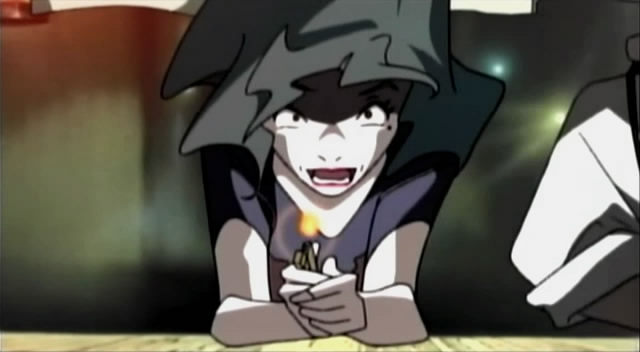 |
| From http://3.bp.blogspot.com/_wBAGCeDbBnw/St8qRjOjyoI /AAAAAAAAFlY/iMBulzJEm-Y/s400/et3uu5.jpg |
Director: Kōji Morimoto
Screenplay: Kōji Morimoto and Dai
Satou
Cast: Masashi Hirose, Yūko
Mizutani, Wasabi Mizuta, Kappei Yamaguchi, Ako Mayama, Tie Kumashiro and
Ken'ichi Ogata
Viewed in Japanese with English Subtitles
Synopsis: In the future, a group of miscreants are brainwashed into
believing they are a family, the footage of them living in an enclosed living
environment sold off as reality television. They become popular - Ben, the
patriarch of the family who is in on the production itself, eldest daughter and
pyromaniac Akiko, baby Michael, obsessed with scissors, violent eldest son
Sasuke, mother A-ko, family dog Tamasaburo, and youngest daughter Sae, who
speaks through a hand puppet. Unfortunately due to a mistake when the toilet
gets blocked, they manage to escape into the real world again and the producers
are forced to get them back.
Built from 30 second segments,
which make up twenty nine minutes, Eternal
Family is an odd proposition for anime marketing nowadays in terms of ever
re-releasing it in the West, due to its small length. Yet an area of anime that
is neglected, and in dire need of more attention even if it is by MP4
downloads, are experimental anime. Or, in the case of Eternal Family, that which is still pop experimentation but
allowing their creators and animators to play and create material that is
unconventional from most anime productions. Sometimes these pieces were part of
anthologies. And in the last few years the premiers for the annual Japan
Animator Expo have been made more easily available online for people to see,
allowing new talent and veterans to experiment. Sometimes however these
one-offs are released by themselves.
 |
| From https://www.animeclick.it/images/ Anime_big/EikyuuKazoku/EikyuuKazoku1.jpg |
Studio 4°C have carved a path for themselves in experimentation and in helping directors like Masaaki Yuasa begin their careers, making a lot of these types of short animation and idiosyncratic productions whilst paying for the bills through working on videogames, music videos and co-productions like the 2011 version of ThunderCats. The man behind Eternal Family, and other projects like Noiseman Sound Insect (1997), is Studio 4°C's co-founder Kōji Morimoto. His most well known work is likely his short for The Animatrix (2003) called Beyond. His most well regarded is his segment for Memories (1995) called Magnetic Rose, the most acclaimed of the three parts, written by the late Satoshi Kon, about a deep space salvage ship who end up trapped on a vessel which infects their memories. His work beyond this, entirely all short form work, is that of someone who likes to make distinct, idiosyncratic experiments which incredible animation. Someone given the keys to make shorts like Eternal Family in the nineties and taking advantage of that fact.
The final result is a combination
of great animation, a vibrant and energetic work entirely filtered through very
intentionally silly humour. One that should be taken serious in terms of its
vibrant animation and colourful aesthetic, a dystopian cityscape of slums and
giant electronic billboards with peculiar details, like the employees of the
reality television show being dressed like St. Francisco de Xavier or
quasi-rabbit costumes. The content itself is entirely ridiculous. You notice
the father of this fake family has a sex doll constantly with him, the camera
which films the TV show, already showing the tone's tongue in cheek. There is
eventually the running gag that his fictitious wife has constipation which is
thankfully just ridiculous rather than turning into bad toilet humour. But then
the family dog is revealed to be able to balloon in size and throw a bark
powerful enough to take out a Dragonball
character and you are fully aware this belongs in the camp of surreal comedy
anime is very known for. Since animation allows exaggeration and flights of
fancy, Eternal Family like many can
be as absurd as possible but with the difference that, due to the animation
quality, the absurdity comes from the kinetic movement and style rather than
gags common in the medium like sweat drops.
In regards to its structure, it
was clearly released in segments and the full version does not try to hide
this. There is something disarming about the first half all ending on the same flushing
toilet shot, but it also evokes the bizarre Cartoon
Network and Nickelodeon shorts I
grew up with in the nineties. Similar to those experiments in scattergun satire
and gross gags, this could have fitted in perfectly if it did not have the few
moments of adult humour (or details like Akiko's pyromania, a subplot which is fleshed
out with her obsession with a man once in her life connected to setting things
on fire). The result is not necessarily high art in story content, but it is
compelling as an energetic and fun production which never becomes tiresome. It
also manages in such a short amount of time to have a plot with emotional
content and progression to it, topping itself in more bizarre content, such as a
chicken the family save from eating potentially having connections to an Illuminati
group of fellow poultry. As an experiment, particularly in the early days of Studio 4°C it, it sets out and succeeds
in its intentions.
 |
| From https://4.bp.blogspot.com/-9EFY-8b30nw/V4DZ-AUfndI /AAAAAAAANHQ/1tGwiob6X5kLpFjKhmyAec MTEJU_FmmSwCLcB/s1600/eternal-family-anime.png |
No comments:
Post a Comment